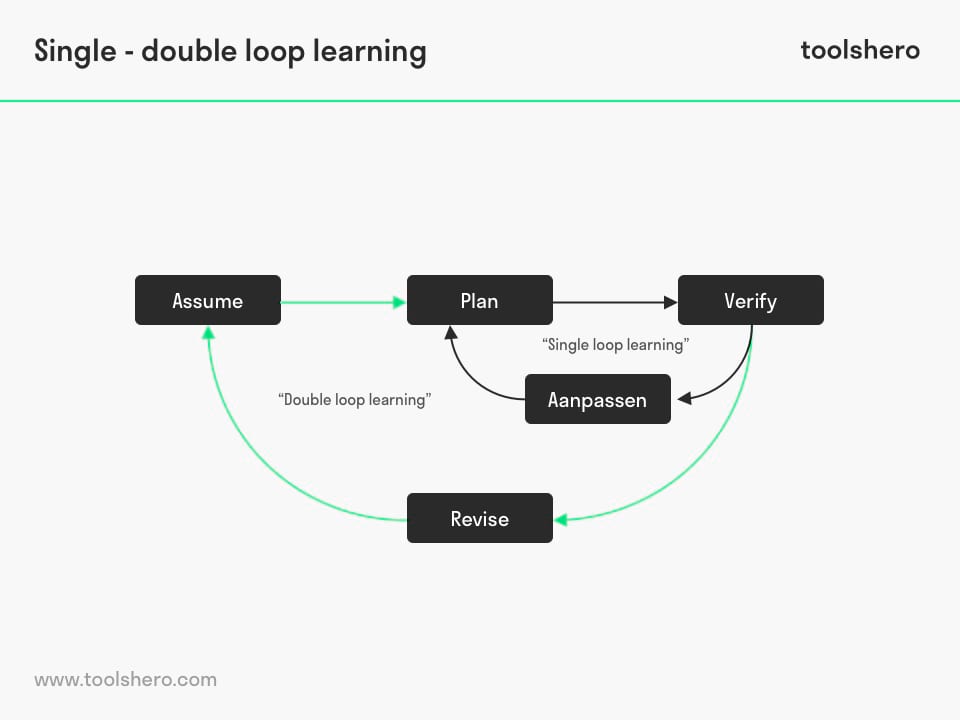Single Loop Learning by Chris Argyris and Donald Schön

Single Loop Learning: this article explains single loop learning and double loop learning, developed by Chris Argyris and Donald Schön in a practical way. After reading you will understand the basics of this powerful change management and behaviour change tool. Enjoy reading!
Single and double loop learning model
People do not always perceive change within organizations as something positive.
Employees do not always see the point and they are resistant when they have to deviate from old habits.
According to Chris Argyris (psychologist) and Donald Schön (philosopher) single and double loop learning is therefore required so that the organization and its employees will improve their understanding of the cause of problems and the effective way of solving them.

Figure 1 – Single and Double Loop Learning Cycle (Argyris and Schon)
Chris Argyris and Donald Schön distinguish three levels of “learning” within organizations:
1. Single loop learning
This form of learning aims at solving the increasing changes and the problems that have risen as a consequence of this. However, this ignores the real cause of the problem.
2. Double loop learning
This form of learning will go more deeply into the cause of the problem and feedback is used to look at past actions.
What were the considerations of the managers and the employees to adopt certain procedures? What went well and what should be improved?
3. Deutero learning
At this stage, levels 1 and 2 are combined with the aim of improving awareness and learning. People learn from the mistakes of the present and the past and they must be capable of admitting this.
The importance of employees
Employees have a large interest in learning within an organization. According to Chris Argyris and Donald Schön employees are an organization’s building blocks and they provide an overview of the organizational memory.
Chris Argyris and Donald Schön argue that there is a gap between what employees say they do (espoused theory) and what they do (theory in use).
This concept of single loop learning, double loop learning and deutero learning is useful for understanding human behaviour when a situation changes.
In single and double loop learning employees are notified of changes through orders, memos and directives issued by authorities. Unfortunately, this often leads to cynicism, de-motivation and defensiveness, which in turn leads to reduced cooperation.
Effective change
In single and double loop previous strategies, SMART Goals, rules and procedures are considered for discussion and the opinions of the employees are taken into account.
Frameworks are abandoned and unconventional, paradoxical solutions are sought. To implement changes effectively, an organization could benefit more from single and double loop, in which the opinions and theories of employees are seriously considered in the implementation of new concepts, agreements and work descriptions.
Besides the fact that employees will be more respectful towards each other, they will also be more loyal to the learning organization.
It’s Your Turn
What do you think? Is the single loop an double loop learning theory still applicable in today’s modern organizations? Do you recognize the practical explanation or do you have more additions? What are your success factors for understanding human behaviour when organization situations change?
Share your experience and knowledge in the comments box below.
More information
- Argyris, C. (1977). Organizational learning and management information systems. Accounting, Organizations and Society, 2(2), 113-123.
- Argyris, C. (1976). Single loop and double loop models in research on decision making. Administrative science quarterly, 363-375.
- Argyris, C.> & Schön, D. A. (1978). Organizational learning: A theory of action perspective. Addison-Wesley.
- Greenwood, J. (1998). The role of reflection in single and double loop learning. Journal of advanced nursing, 27(5), 1048-1053.
- Kim, D. H. (1998). The link between individual and organizational learning. The strategic management of intellectual capital, 41-62.
- Website ExamLabs. Retrieved 02/20/2024 from ExamSnap.com
How to cite this article:
Van Vliet, V. (2012). Single and Double loop learning model. Retrieved [insert date] from Toolshero: https://www.toolshero.com/change-management/single-loop-learning/
Original publication date: 02/23/2012 | Last update: 02/20/2024
Add a link to this page on your website:
<a href=”https://www.toolshero.com/change-management/single-loop-learning/”>Toolshero: Single and double loop learning model</a>












